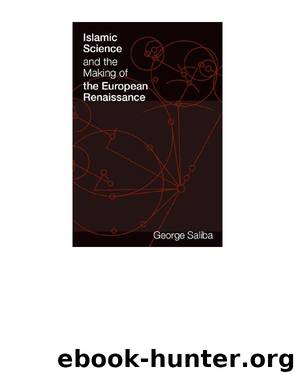Islamic Science and the Making of the European Renaissance by George Saliba

Author:George Saliba
Language: eng
Format: epub
Publisher: MIT Press
Islamic Responses to Ptolemaic Astronomy: Creating an Alternative Astronomy
We have already seen several levels of responses to what was perceived as factual mistakes in the Ptolemaic tradition. Whether it was in simple mistakes in texts, or basic parameters, or even methods of observations, those were attended to and began to be fixed as early as the ninth century. New genres of writings addressing specifically the totality of those Ptolemaic problems, called shukūk, istidrāk, and the like were developed and sophisticated with time, so much so that they became subjects of discussion on their own by people who were not even astronomers by profession.
Serious attention to the philosophical and physical underpinnings of the Ptolemaic edifice, otherwise signaled as model building, and serious attempts to replace the inadequate Ptolemaic models did not begin until the eleventh century. But once it began, almost every serious astronomer felt that he had to take part in the enterprise. In the sequel I will only signal those who made fundamental shifts in the way astronomy was practiced to the neglect of others who kept the discipline alive by supplying the commentaries and the individual modifications that they saw the major shifts required, or simply made use of those shifts to overhaul the then current astronomy in order to incorporate those changes.23 For example, when the trigonometric functions were introduced into the Islamic scientific tradition, and were perfected after being originally derived from the few functions already known in India, the tendency was to use those functions in any theoretical discussion of astronomy instead of the chord functions that were used in the Almagest and its translations.
It is these kinds of shifts that produced the astronomy that could then be called Arabic/Islamic astronomy, and whose example we hope the other disciplines had followed. In what follows, however, I will pay a special attention to the most subtle shifts that played, in my judgment, a catalytic role in producing other astronomical innovations, and became part of the universal legacy of astronomy. As was already said, I will neglect those who periodically took in those conceptual shifts and integrated them in their works without producing any shifts of their own.
The focus will then be on those astronomers who felt that they needed to invent new concepts, or more concretely new mathematical theorems, in order to solve the problems of Ptolemaic astronomy, and not that much on those who followed them by incorporating the latest theorems to build upon them in order to create new planetary models of their own. Of those who introduced such new theorems, the names of Muʿayyad al-Dīn al-ʿUrḍī(d. 1266) and Nasṣīr al-Dīn al-Ṭūsī (d. 1274) stand out on account of the fact that each of them supplied his own mathematical theorem while undertaking to overhaul the fundamental features of Ptolemaic astronomy.
Download
This site does not store any files on its server. We only index and link to content provided by other sites. Please contact the content providers to delete copyright contents if any and email us, we'll remove relevant links or contents immediately.
Learning SQL by Alan Beaulieu(6280)
Weapons of Math Destruction by Cathy O'Neil(6265)
Digital Minimalism by Cal Newport;(5749)
iGen by Jean M. Twenge(5408)
Sapiens by Yuval Noah Harari(5366)
The Age of Surveillance Capitalism by Shoshana Zuboff(4275)
Elon Musk by Ashlee Vance(4121)
Thing Explainer by Randall Munroe(3930)
Apollo 8 by Jeffrey Kluger(3702)
Future Crimes by Marc Goodman(3592)
The Science Book (Big Ideas Simply Explained) by DK(3277)
The Innovators: How a Group of Hackers, Geniuses, and Geeks Created the Digital Revolution by Walter Isaacson(3154)
Who Can You Trust? by Rachel Botsman(3129)
I Live in the Future & Here's How It Works by Nick Bilton(2993)
Infinite Energy Technologies by Finley Eversole(2974)
Steve Jobs by Walter Isaacson(2889)
Dawn of the New Everything by Jaron Lanier(2770)
Chernobyl by Serhii Plokhy(2535)
Ben Franklin's Almanac by Candace Fleming(2523)
